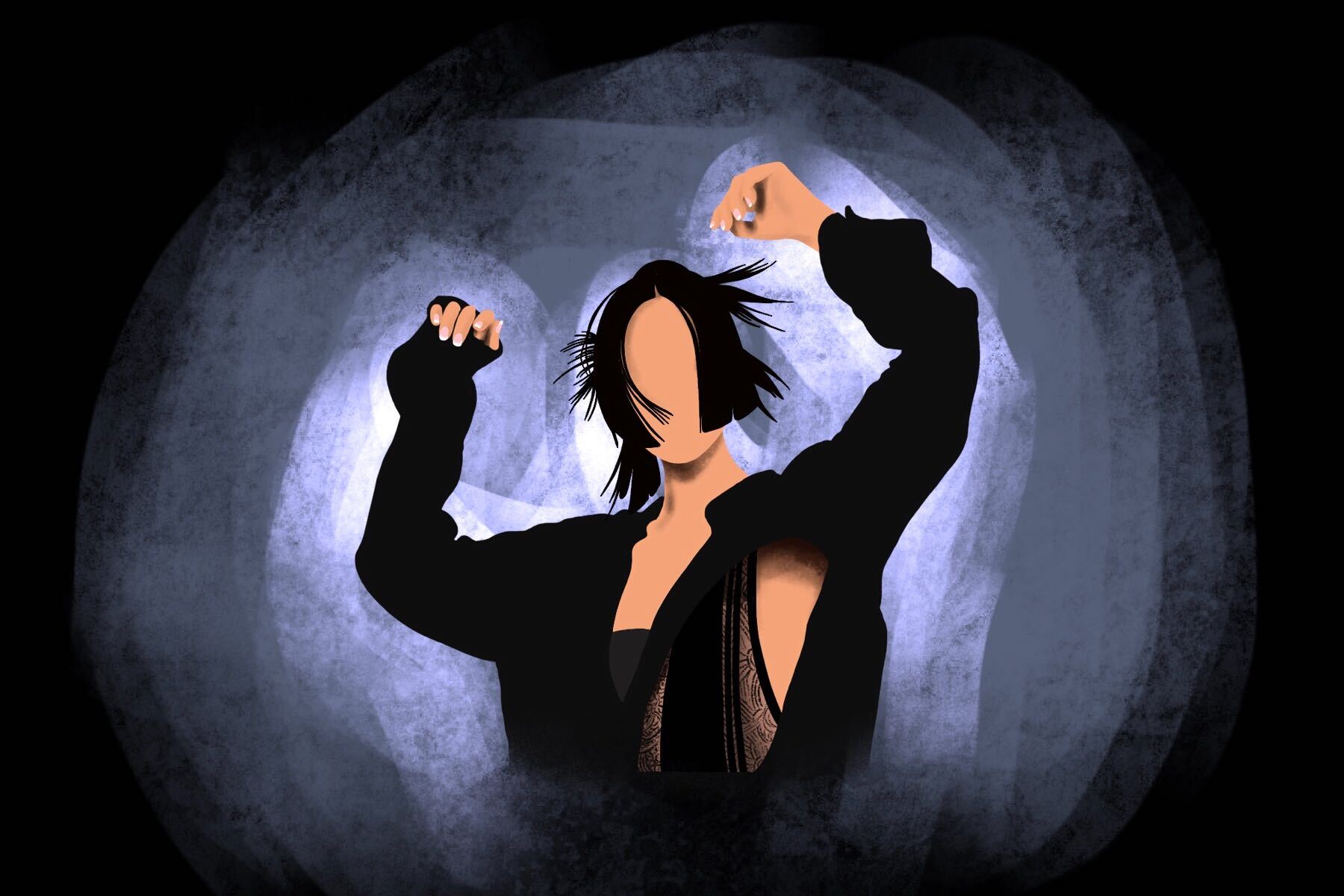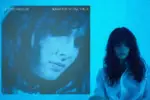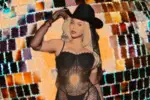In a moment of voluntary seclusion in January, Columbian Canadian singer Valerie Teicher Barbosa, otherwise known as Tei Shi, was met with feelings of impending doom. She was at a writer’s retreat in El Paso, Texas, where, within six days, she wrote the EP “Die 4 Ur Love,” a sublime encounter with the tenderness of emotional release.
Tei Shi spoke to Paper Magazine about the EP and its production, particularly the way in which she began the year already stuck within a balky and somber place. Confronted with loose ends and an ominous consciousness of the imminent future, “Die 4 Ur Love” savors the notion of moving forward, connecting loss and emptiness to energetic synths that urge inner transformation.
“Die 4 Ur Love” toys with the idea of an apocalypse, something that has clearly become eerily more relevant, even months after it was initially written. Yet, it is an almost buoyant response to personal hardship, pointing to the desire of emotional release the EP is searching for, manifesting itself in dance anthems. Tei Shi continued her interview with Paper Magazine by discussing the specific emotions that drive the EP, particularly “obsession and dissociation” — themes that continue to assert their relevance in light of the pandemic.
Before “Die 4 Ur Love,” Tei Shi was feeling frustrated with her record label, resulting in her eventual exit. This was a difficult time for Tei Shi, posing challenges for her both personally and professionally. Under her old record label, Downtown Records, Tei Shi released her first studio album, “Crawl Space,” in 2017, followed by “La Linda” in 2019. “La Linda” featured the melodic and yearning single “Even If It Hurts,” a collaboration with musical artist Blood Orange. Tei Shi and Blood Orange had a tour planned this year, which was unfortunately canceled due to the pandemic.
Tei Shi’s previous work follows similar aural motifs — intricate, whispered harmonies that oscillate melodically. “Die 4 Ur Love” is similar, but with dynamic and lively synth beats that reposition the EP stylistically. This allows the EP to establish itself as an upbeat, dance-inducing project in response to a part of Tei Shi’s life that felt like a “personal apocalypse.” However, this was her vision for the EP in January, a concept that shifted as the subsequent quarantine provoked changes in life all together.
In an interview with Flood Magazine, Tei Shi spoke on the way quarantine impacted the emotional narrative of the EP. Tei Shi knew she wanted the EP to feel intense and chaotic, yet fun at the same time. These were also emotions that Tei Shi said she needed the most during quarantine, and became the emotions that she wanted to channel throughout the EP. The frustrations of quarantine also urged Tei Shi to find emotional release within dance, another driving inspiration for the record.
In early May, Tei Shi released the first single from the EP, the recording’s title track. The single “Die 4 Ur Love” encompasses apocalyptic turmoil in tandem with romantic anecdotes. Alongside shadowy harmonies that build a dreamlike realm of emotions, Tei Shi sings, “I was running through a burning field / Thought I saw your face up in the clouds / Are you gonna rescue me / I’m tripping on a fantasy.” The desire to escape is met with musings of an apocalypse within the song as well, with Tei Shi singing the word “apocalypse” throughout the chorus. The song “Die 4 Ur Love” taunts the idea of an apocalypse as the foreground of the EP, confronting an unexpected loss, particularly among the dichotomy between dreams and nightmares.
The music video for the single “Die 4 Ur Love” was shot from home, mixing footage of Tei Shi in quarantine as she dances next to a purple car dressed in all back, sings alone in her bedroom, plays dress-up with herself, lies on her bedroom floor and dances outside.
Similar to the same emotional energy that the EP explores, the last shot featured in the video for “Die 4 Ur Love” perfectly replicates the format of a Zoom call, with a variety of shots of Tei Shi around her house. This speaks to the other conversation Tei Shi’s work interacts with, as her romantic loss feels equally applicable to the changing state of the world.
Each song off of “Die 4 Ur Love” explores isolation, running from problems and surviving chaos. The EP’s first track, “Johnny,” an upbeat ode to “abandonment and loss,” follows a similar concept of disappearing. This sets the tone for the EP’s emotional brevity, as tracks such as “Ok Crazy” feature beat switches that pair dance-inducing rhythms alongside an emotional struggle.
Tei Shi sings, “If you’re feeling like you’re living in a nightmare / It might be a daydream / everybody get on the floor” — a moment that basks in its danceable elements, speaking to the release Tei Shi was hoping to provide. The EP’s last track, “Disappear,” a slower track removed from Tei Shi’s familiar synth-driven beats, finds the artist contemplating disappearing as a solution to her problems.
While the lyrics of “Die 4 Ur Love” feel applicable to a breakup, they also relate to a world in flux as it pairs romantic loss with the reality of 2020. Although the EP was written in January, it senses a dark future. Overall, “Die 4 Ur Love” responds to a complex range of emotions, particularly experiencing both emotional shock and emotional numbness at once.
Tei Shi began 2020 amidst a symbolic state of transformation that served as the catalyst for the depth of “Die 4 Ur Love.” She has spoken about not really sticking to one genre, stating she “tries to make music that isn’t one thing or the other.” Instead, Tei Shi’s work teeters among exploring the commonalities between losses and the way in which 2020 has reckoned with a spectrum of hardship.
In its entirety, “Die 4 Ur Love” confronts the difficult transformation that the pandemic has posed among an intrinsically upbeat sound. As artists respond to the social urgency of the pandemic, the conversation shifts toward the subjects the music explores. “Die 4 Ur Love” relishes in a desire to dance, carefully balancing the changing nature of dance ballads alongside the changing reality of the world, and provokes conversations pertaining to the way the pandemic has changed familiar notions of producing art.
















